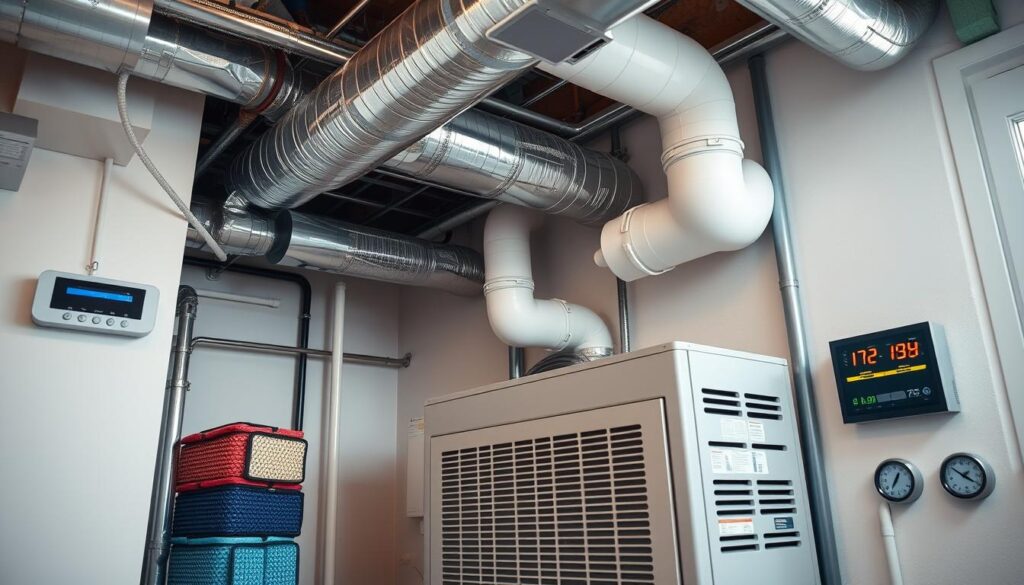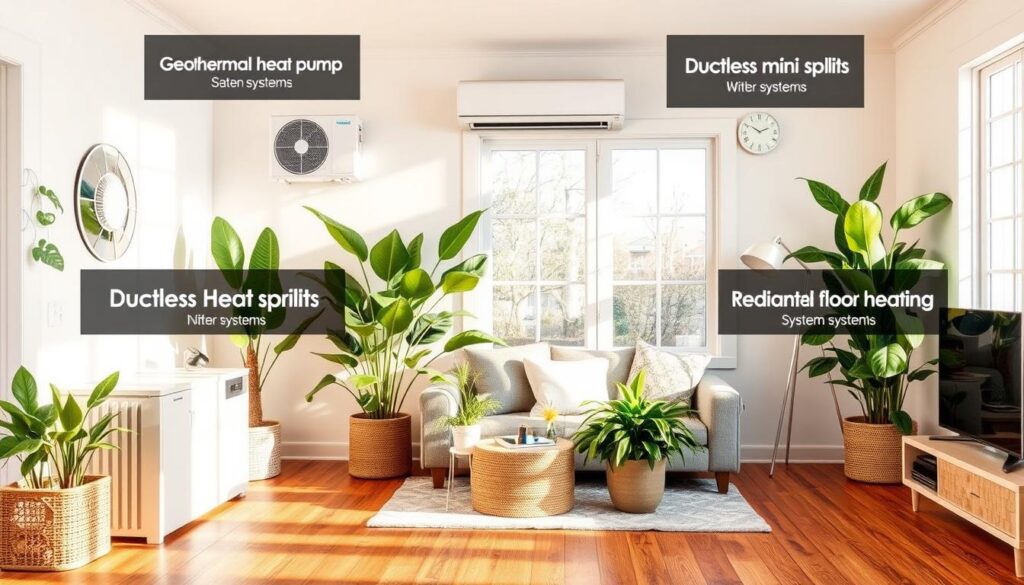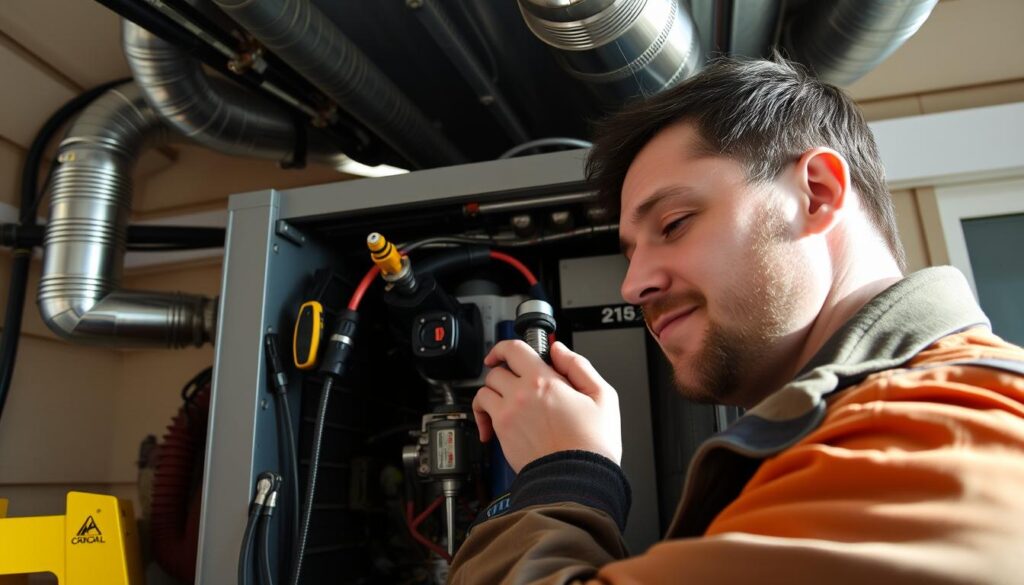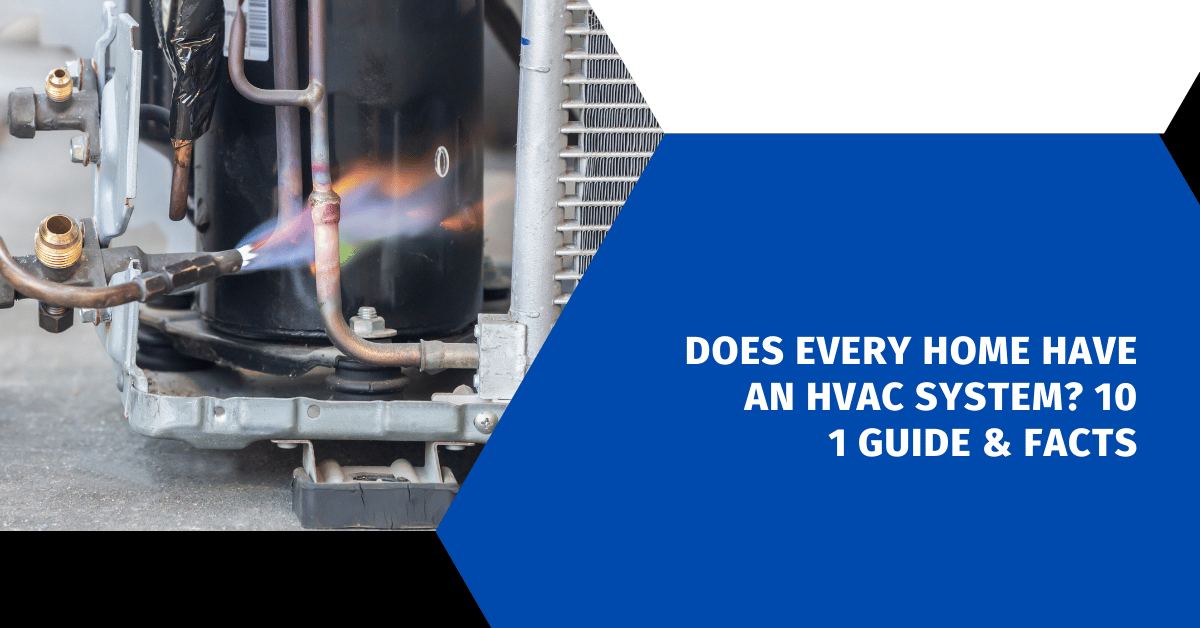Affiliate Disclosure
HVAC Guide Guys is a participant in the Amazon Services LLC Associates Program, an affiliate advertising program designed to provide a means for sites to earn advertising fees by advertising and linking to Amazon.
Does Every Home Have an HVAC System? Keeping your home comfortable is a big deal for homeowners in the U.S. The HVAC system is key to this. It controls temperature, humidity, and air quality. But, do all homes have an HVAC system? Let’s look into the facts and guide you through the world of residential HVAC systems.
“The only way to do great work is to love what you do.” – Steve Jobs

Key Takeaways
- HVAC systems are responsible for heating, ventilation, and air conditioning in homes.
- 20% of Americans needed to repair or replace their HVAC systems in the last year.
- The HVAC industry is significant, with three million heating and cooling systems replaced annually in the U.S.
- $14 billion is spent on HVAC services or repairs annually in the U.S.
- Approximately 90% of American households use some form of HVAC systems.
Table of Contents
Understanding HVAC Systems: Definition and Basics
HVAC stands for heating, ventilation, and air conditioning. These systems are key to keeping your home comfortable and the air clean. Knowing how they work helps you make smart choices about installation, upkeep, and saving energy.
What HVAC Stands For
The HVAC acronym breaks down into three main parts of a home climate control system:
- Heating – This includes furnaces, boilers, and heat pumps that warm the air or water in your home.
- Ventilation – The system that circulates and filters the air, ensuring proper air flow and indoor air quality.
- Air Conditioning – The cooling component, usually an air conditioner or heat pump, that lowers the temperature and removes humidity from the air.
Primary Components of HVAC Systems
A typical HVAC system has several important parts. These include a thermostat, furnace or heat pump, air conditioner, air ducts, and air filters. Together, they heat, cool, and circulate air, keeping your home comfortable.
Role in Home Comfort
HVAC systems use about half of a home’s energy. They are essential for managing energy use and costs. By efficiently heating, cooling, and ventilating, HVAC systems ensure your home’s comfort, air quality, and energy efficiency.
Does Every Home Have an HVAC System?
Residential home temperature control systems, known as HVAC, are common in many U.S. homes. But, not every home has one. The use of HVAC systems varies by climate, building age, and regional preferences.
HVAC systems are more common in newer homes and areas with big temperature changes. They help keep homes comfortable and save energy. Yet, some homeowners choose other options, especially in older or smaller homes.
Some homes use individual air conditioners or space heaters instead of HVAC. Others might have fireplaces, wood stoves, or electric heaters for warmth. The choice depends on the home’s design, the owner’s taste, and the local weather.
In the Raleigh-Durham-Chapel Hill area of North Carolina, about 90% of homes have residential hvac systems. But, this number changes in other parts of the country. Older homes and places with milder weather might have fewer HVAC systems.
Even though HVAC systems are common, there are other heating and cooling options. The best choice depends on each home’s unique needs and its occupants.
Explore Our HVAC Shop
Looking for top-rated HVAC tools, parts, and accessories? Visit our shop and find the perfect solution for your needs.
Visit the ShopDifferent Types of HVAC Systems for Homes
There are many HVAC systems for homes. The right one depends on your home’s size, local climate, and energy goals. Let’s look at the common types for homes.
Traditional Split Systems
Split systems are popular in modern homes. They have indoor and outdoor units. The indoor unit handles air, and the outdoor unit has the compressor and condenser coil. They are efficient and quiet.
Ductless Mini-Split Systems
Ductless mini-splits are great for homes without ducts. They cool and heat specific rooms or additions. These systems are compact and offer precise control and high efficiency.
Packaged Heating and Cooling Systems
Packaged systems have everything in one outdoor cabinet. They are perfect for small homes or places with little indoor space. They are often used in smaller homes, apartments, and commercial spaces.
Choosing the right HVAC system is important. Proper installation and regular maintenance are key for best performance and savings. A professional HVAC contractor can help pick the best system for your home.
Essential Components of Modern HVAC Systems
Modern HVAC systems are key to keeping your home comfortable. They have several important parts that work together. Knowing these parts helps you choose the right HVAC installation and care for it.
The heart of an HVAC system is the furnace or heat pump for heat, and the air conditioner or heat pump for cool. These units control your home’s temperature. Inside, the air handler has the blower, motor, filter, and coil. It moves air and cools it by removing heat and moisture.
Ductwork is vital as it carries conditioned air to your home’s rooms. Good duct design and setup are key for indoor air quality and air flow.
- Thermostats, both manual and programmable, control the temperature and run the HVAC system.
- Filters catch dust, pollen, and other particles, keeping the air clean and healthy.
- Air purifiers and humidifiers can improve indoor air quality by removing pollutants and controlling moisture.
Smart technologies are now part of HVAC systems. Smart thermostats adjust settings for you and work with home automation for better energy use and convenience.
Knowing about HVAC system parts helps homeowners choose the best for comfort and energy savings. Regular upkeep and updates keep your system working well for many years.
Explore Our HVAC Shop
Looking for top-rated HVAC tools, parts, and accessories? Visit our shop and find the perfect solution for your needs.
Visit the ShopHow HVAC Systems Impact Energy Consumption
Heating, ventilation, and air conditioning (HVAC) systems keep our homes comfortable. But they also affect our energy use and bills. Knowing how efficient HVAC equipment is helps homeowners save energy and money.
Energy Efficiency Ratings Explained
HVAC systems have ratings for energy use. Furnaces are rated by the Annual Fuel Utilization Efficiency (AFUE). This shows how much fuel is turned into heat. Air conditioners and heat pumps get a Seasonal Energy Efficiency Ratio (SEER2) for cooling. Heat pumps also have a Heating Seasonal Performance Factor (HSPF2) for heating.
Higher ratings mean better energy use and lower costs. ENERGY STAR certified HVAC is even more efficient. Switching to these systems can cut energy bills by 10-30% each year.
Cost-Saving Potential
Getting your HVAC right is key to saving energy. Bad installations can use up to 30% more energy. Regular upkeep, like changing filters and cleaning coils, keeps systems running well.
Choosing efficient HVAC systems may cost more upfront. But the savings over 10-15 years make it worth it. New HVAC tech could save even more energy and money.
“Upgrading to ENERGY STAR-qualified HVAC systems can result in annual energy bill savings of 10-30%.”
Common Alternatives to Traditional HVAC Systems
Traditional HVAC systems are common in American homes. But, there are other options for specific needs. These alternatives work well in certain climates or smaller spaces. Let’s look at some common residential hvac and heating and cooling systems alternatives.
Window Air Conditioners
Window air conditioners are a budget-friendly way to cool rooms. They’re easy to set up and cool one room well. But, they use more energy than central residential hvac systems and can’t cool the whole house.
Portable Heaters
Portable heaters are great for extra warmth in small areas. They’re cheap, easy to move, and warm up specific spots. They’re perfect for small heating needs or as a backup to heating and cooling systems.
Radiant Heating
Radiant heating systems warm up floors, walls, or ceilings. They’re efficient and heat evenly. But, they cost more to install than traditional systems.
Evaporative Coolers
Evaporative coolers, or “swamp coolers,” are good for dry climates. They cool air by evaporation. They’re energy-efficient but don’t work well in humid areas.
Geothermal Systems
Geothermal heat pumps use underground temperatures for heating and cooling. They’re very efficient and save energy. But, they need a big investment for installation.
Each alternative has its own pros and cons. Homeowners should think about their needs, climate, and budget. This will help choose the best option for their home.

Explore Our HVAC Shop
Looking for top-rated HVAC tools, parts, and accessories? Visit our shop and find the perfect solution for your needs.
Visit the ShopHVAC Installation Considerations and Costs
Residential hvac installation costs vary based on several factors. The size of your home, the hvac system type, and location all affect the price. In the US, installing a new hvac system usually costs between $5,000 and $12,500. The average cost is about $7,500.
Factors Affecting Installation Prices
The type of system you choose greatly impacts costs. Window or portable air conditioners cost between $150 and $500. Ductless mini-split systems range from $2,000 to $14,500. Central air systems cost between $1,900 and $5,500, and furnaces can be $1,600 to $10,000.
Installation complexity also affects prices. Needs for ductwork changes, indoor air quality upgrades, and project difficulty can increase costs. Expect to pay about $15 per linear foot for new ductwork. Additional components can add $9,500 to $18,500 to the total cost.
Professional vs DIY Installation
While DIY installation might seem appealing, it’s usually best to hire a professional. Improper installation can harm efficiency, safety, and warranty validity. Professionals ensure your system is correctly sized and operates efficiently. Although professional installation costs more, the long-term benefits are worth it.
When planning your hvac installation, research and compare quotes. Consider energy efficiency, maintenance, and comfort impact. With the right contractor, your new hvac system will be installed correctly, offering long-term value.
Maintenance Requirements for HVAC Systems
Keeping your HVAC system in good shape is key. Regular checks and tune-ups prevent expensive repairs. They also make your system work better, saving you money on energy bills and keeping your home comfy.
Knowing what your HVAC system needs is important. It helps keep the air inside your home clean. It also makes your climate control equipment last longer.
Seasonal HVAC Maintenance Checklist
- Schedule professional maintenance checks in the spring and fall seasons
- Replace air filters every 30-90 days to maintain indoor air quality
- Clean condenser coils and inspect for debris or obstructions
- Check electrical connections and tighten any loose fittings
- Inspect ductwork for leaks or damage that could impact airflow
- Ensure proper refrigerant levels and look for any signs of leaks
- Test thermostat functionality and calibrate as needed
Following the manufacturer’s maintenance schedule is important. It keeps your warranty valid and your system running efficiently. Regular maintenance stops big problems before they start. It also makes your equipment last longer, saving you money in the long run.
| Maintenance Service | Average Cost |
|---|---|
| Routine HVAC Tune-Up | $150 – $300 |
| HVAC Coil Cleaning | $100 – $400 |
| HVAC Duct Cleaning | $300 – $700 |
| AC Unit Maintenance | $150 – $650 |
| Furnace Maintenance | $125 – $480 |
| HVAC Ductwork Maintenance | $200 – $700 |
Regular hvac maintenance improves indoor air quality and energy efficiency. It also makes your HVAC system last longer. This means you get reliable comfort all year.
Explore Our HVAC Shop
Looking for top-rated HVAC tools, parts, and accessories? Visit our shop and find the perfect solution for your needs.
Visit the ShopSigns Your Home Needs an HVAC System Upgrade
As your home’s HVAC system gets older, watch for signs it needs an upgrade. Systems over 10-15 years old often lose efficiency and break down more. This can lead to higher repair costs and energy bills. Here are the main signs it’s time for a new HVAC system.
Age-Related Factors
The Department of Energy suggests replacing HVAC systems every 10-15 years. After this, systems can start to fail, even with regular maintenance. Older systems might use harmful refrigerants like freon.
Performance Indicators
- Frequent Repairs: If your HVAC system needs repairs often, and the costs are more than half of a new system, it’s time to upgrade.
- Rising Energy Costs: A new, efficient HVAC system can cut your monthly bills by 20-40%. If your bills keep going up, a new system might help.
- Decreased Performance: Older systems may not cool or heat your home evenly. This can make your home uncomfortable.
Getting a new, energy-efficient HVAC system can make your home more comfortable. It also cuts down on energy use and helps the environment. With financing options, the long-term benefits often make the initial cost worth it.

By paying attention to signs your HVAC system needs an upgrade, you can keep your home comfortable and energy-efficient. This also helps the environment for years to come.
Energy Efficiency and Environmental Impact
HVAC systems are key in how much energy homes and buildings use. Choosing the right, installing, and maintaining high-efficiency HVAC can cut down energy use and emissions.
Studies show HVAC systems use 39% of all electricity in buildings. The U.S. Department of Energy says up to 30% of HVAC costs are lost. This shows we need energy-saving HVAC solutions.
Switching to ENERGY STAR-certified HVAC systems can save a lot of energy. Replacing an old air conditioner with a new one can cut cooling costs by up to 40%. Sealing ducts can boost HVAC efficiency by 20%, and changing air filters regularly can save 10% of energy.
New technologies like electrocaloric heat pumps and advanced heat exchangers promise better efficiency and less harm to the environment. These systems will help reduce the energy efficiency hvac and home temperature control impact.
“Increasing energy efficiency investments by just 1-4 percent in commercial buildings in the United States could save as much as $60 billion.”
By focusing on energy efficiency hvac and following best practices, we can help the environment and save money on energy costs.
| Technology | Energy Savings |
|---|---|
| ENERGY STAR-certified HVAC systems | Up to 40% on cooling costs |
| Properly sealed heating and cooling ducts | At least 20% improvement in HVAC efficiency |
| Regularly changed air filters | Up to 10% reduction in wasted energy |
Explore Our HVAC Shop
Looking for top-rated HVAC tools, parts, and accessories? Visit our shop and find the perfect solution for your needs.
Visit the ShopLatest Innovations in HVAC Technology
The HVAC world is always changing. New technologies are coming out to make energy use better, air cleaner, and homes more comfortable. These advancements are changing how we live and work.
Smart HVAC Systems
Smart HVAC systems are a big deal now. They use sensors, learning tech, and internet to save energy and fit your needs. Smart thermostats, for example, learn your habits and adjust the temperature to save energy but keep you comfy.
You can also control these systems from anywhere. This means your home or office stays just right, no matter where you are.
Energy-Saving Features
Companies are working hard to make HVAC systems more energy-efficient. New heat exchangers cut down on refrigerant loss, making systems more energy efficient hvac. Some systems even use water instead of traditional refrigerants, which is better for the planet.
The U.S. Department of Energy is funding research into even more advanced tech. This could make HVAC systems up to 50% more efficient.
As people want better indoor air quality and energy savings, the HVAC industry is stepping up. These new technologies mean better comfort, lower bills, and a greener future for everyone.
| Innovation | Benefits |
|---|---|
| Geothermal HVAC systems | Deliver four times the efficiency of conventional HVAC systems |
| Ductless HVAC systems | Save between 30 and 40 percent off energy costs compared to a forced air system |
| Thermally driven air conditioning systems | Have lower operating costs and are typically much more efficient and reliable than traditional systems |
| Dual-fuel heat pumps | Have no emissions and provide a backup option to heat a home or business more affordably if natural gas prices rise |
Conclusion
Not every home has an HVAC system, but they’re common in modern homes, especially in areas with harsh weather. Choosing the right HVAC system depends on several things. These include the climate, size of your home, and your goals for energy efficiency.
Regular maintenance and keeping up with new technology are key. They help you stay comfortable while saving energy and being kind to the environment.
HVAC systems are vital for comfort all year and keeping the air clean inside. They can last 10 to 15 years with the right care. Knowing about SEER, AFUE, and Energy Star can help your system work better. This means lower bills and less harm to the planet.
New HVAC tech like smart thermostats and variable-speed motors is changing how we control our homes’ climate. By keeping up with your HVAC’s needs, you can enjoy a cozy home. And you’ll help make the world a greener place.

